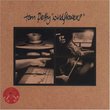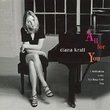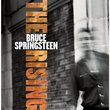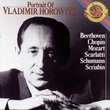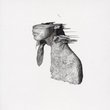| All Artists: Eroica Trio, Johannes Brahms Title: Brahms: Piano Trios Nos. 1 & 2 Members Wishing: 0 Total Copies: 1 Label: Angel Records Release Date: 1/29/2002 Genres: Dance & Electronic, Pop, Classical Styles: Vocal Pop, Chamber Music, Historical Periods, Classical (c.1770-1830) Number of Discs: 1 SwapaCD Credits: 1 UPCs: 724355719928, 724355719959 |
Search - Eroica Trio, Johannes Brahms :: Brahms: Piano Trios Nos. 1 & 2
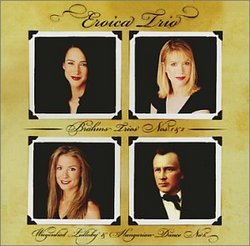 | Eroica Trio, Johannes Brahms Brahms: Piano Trios Nos. 1 & 2 Genres: Dance & Electronic, Pop, Classical
The Eroica Trio's recording career has been cleverly managed, starting with three albums of relatively lightweight, very well played music before finally arriving at major repertory. Tackling these two Brahms masterpieces,... more » ![header=[] body=[This CD is available to be requested as disc only.]](/images/attributes/disc.png?v=a4e11020) ![header=[] body=[This CD is available to be requested with the disc and back insert.]](/images/attributes/disc_back.png?v=a4e11020) ![header=[] body=[This CD is available to be requested with the disc and front insert.]](/images/attributes/disc_front.png?v=a4e11020) ![header=[] body=[This CD is available to be requested with the disc, front and back inserts.]](/images/attributes/disc_front_back.png?v=a4e11020) |
Larger Image |
CD DetailsSynopsis
Amazon.com The Eroica Trio's recording career has been cleverly managed, starting with three albums of relatively lightweight, very well played music before finally arriving at major repertory. Tackling these two Brahms masterpieces, the Eroica proves thoroughly up to the task. They handle Brahms's difficult writing with confidence (especially the tricky syncopations), and they can produce large climaxes to compete with the best ensembles. They also capture the rapt, inward quality of Brahms's slow movements (the third of the First Trio, the second of the Second Trio) in a most moving manner, trusting the listeners' attention to hear the meaning in such subtle music. Even the packaging of this disc is more subdued than on previous Eroica CDs, although the group's characteristic poplike liveliness comes out in the charming encores. In discussing Brahms Trio recordings, one has to mention one of the best buys in the current CD catalog, a three-disc set with all the Brahms Trios and three other romantic masterpieces superbly played by the Kalichstein-Laredo-Robinson Trio. But for excellent performances of these two trios, the Eroica CD is certainly worth considering. --Leslie Gerber Similar CDs
Similarly Requested CDs
|
CD ReviewsHEARTBREAKING, BREATHTAKING BRAHMS Melvyn M. Sobel | Freeport (Long Island), New York | 06/25/2003 (5 out of 5 stars) "Not since Nigel Kennedy's recording of the Brahms Violin Concerto have I been moved to tears by a performance. The Eroica Trio, living up to its name, is truly "heroic" in its fearless, unabashed, resounding romantic fervor, heady emotional sweep, exceptional inspiration, and excruciatingly beautiful Brahmsian vision. The ladies who comprise The Eroica Trio are more than simply extraordinary musicians: they are seekers, searchers, and intuitives. They would have to be. Playing Brahms like this requires the rarest exploratory nature, the willingness to probe at the deepest possible levels, and the courage to commit to your beliefs. No mere coincidence, then, that this present set of Brahms' first two piano trios is, because of the phenomenal artistry of these women, the sound world given them, and the immense epiphany of it all, absolutely quintessential listening, and for me, ranks as the very best versions now available.[Running time: 64:31]" Difficult Music Handled Exqusitiely rodboomboom | Dearborn, Michigan United States | 03/07/2002 (5 out of 5 stars) "I enjoy the variety of moods and subtle synocpations in this music of Brahms.Enjoying this genre of chamber music greatly, this is a worthy addition. From the soothing flowing piano and violin of the opening tract: Trio No. 1 to the closing familiar "Lullaby," this music adorns one's ears with a pleasing sound.The Trio No.1 in B Major has a major/minor dichotomy going, while the strings and piano trade spurts of the passage.Especially wonderful is the opening violin/cello movement of the Trio No. 2 in C Major, which sounds very much like a sonata, building in its intensity to a sensational ending coda.Nice personal touch of including the Wiegenlied for the newly arrived children of the musicians!" Vintage Brahms fluently played Bahij Bawarshi | Beirut, Lebanon | 09/01/2009 (5 out of 5 stars) "I think most Brahms fans who had not heard these piano trios before, if asked to guess, would identify the composer on the first try, so typical of Brahms are the harmonies and the melodies. Or I should say late Brahms. In his early work he was influenced by Schumann, and he studied Bach and Beethoven; yet Brahms was his own man, a perfectionist with a distinguishing style that matured over the years. Both piano trios belong to the late period and display Brahms at his best. The B major trio, op. 8 is an extensive revision of an early work (still published, though rarely performed) that Brahms made in 1890, some 36 years after composing the original version; he (or his publisher) did not bother to give it a new opus number. The trio in C major, op. 87 dates from 1882. Both compositions are veritable masterpieces of the genre. On first hearing, most people would probably prefer op. 8, with its impressive opening theme, nostalgic slow movement, and a finale that is almost symphonic in character. But with repeated listening, the unmistakable greatness of op. 87 forces itself upon the listener. The Eroica Trio keeps up with the many shifting moods and melodies of the pieces -- noble, restless, lyrical, tense, sunny, or exuberant. The players navigate the transitions fluently, a good indication of their mastery of these works. Brahms is not easy to play, yet the Eroica's music flows so naturally, they make it appear easy -- one senses that the threesome are not only making music but loving/living every moment of it, the generally warm tone of the recording adding to the impression.
For an encore, there is the ever popular Hungarian Dance No. 6. Eroica even offers us an after-dinner mint chocolate in Brahms' Wiegenlied, surely the best known lullaby of all time. The two pieces were arranged for trio by the ensemble's cellist, Sara Sant'Ambrogio. I recommend this exceptionally good disc without reservation. " |

 Track Listings (10) - Disc #1
Track Listings (10) - Disc #1




